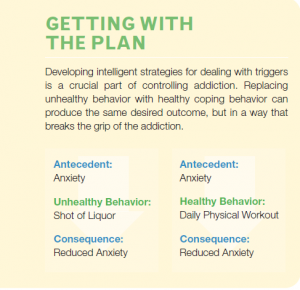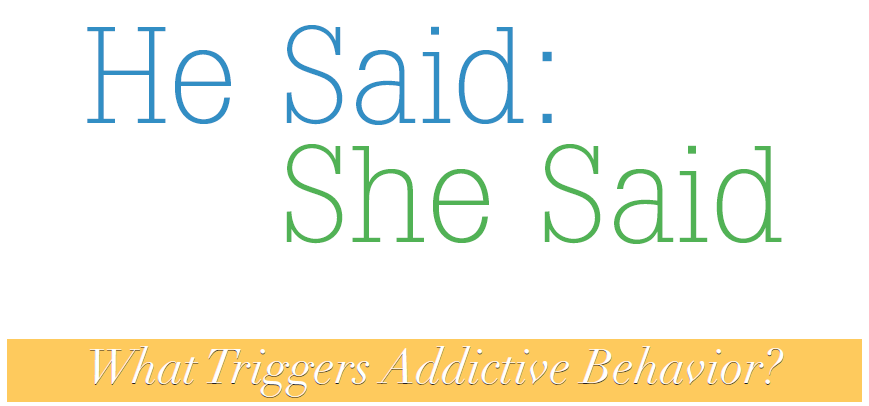Addiction is an issue that impacts everyone in some way. To overcome addiction—whether it is your own, a friend’s or a loved one’s—it is crucial to understand what addiction is, how it works, and why it is so easy to fall back into unhealthy habits. Trinitas psychologists Dr. Rodger Goddard and Dr. Patricia Neary-Ludmer discuss the role that “triggers” play in addictive behavior…
Goddard: There are many definitions of addiction including those that are used in a clinical psychiatric setting and those that are used in everyday language and everyday settings. A broad definition of addiction involves things that we consume or do compulsively, that are injurious to our health or happiness, and are very difficult to give up. These can be referred to as health-compromising habits. Health compromising habits may include compulsive shopping, unhealthy eating, overuse of computers or video games, self-doubt, negative emotional states, and so on.
Neary-Ludmer: Another important aspect of addictions— whether we are referring to eating disorders, substance abuse, compulsive behavior or tobacco use—is that they can be viewed as unhealthy coping behaviors. Boredom, anxiety, depression, trauma and failure are just a few of the triggers that might be antecedents to these addictive behaviors. When the unhealthy behavior leads to a reduction in the unwanted feelings, the behavior is reinforced. For example, a high-school student feeling rejected by peers may restrict eating or purge as a way of feeling more in control. Self- destructive cutting behavior also can lead to a reduction in emotional pain. And of course numbing emotional pain through the use of alcohol and drugs is a common pathway to addiction. Problems disappear for the moment, but are still there once the drugs and alcohol wear off.
Goddard: Triggers are the actions, events, people and things that initiate the addictive action. Triggers may become almost as rewarding as the addiction itself—they elicit brain chemistry changes similar to the actual addictive substance or behavior. They trap and lock us into the addiction. For alcoholics, the sound of ice jiggling in a glass, a bottle being opened, or the pouring of wine, beer or gin can heighten the urge for relief from stress by having a drink at the end (or beginning!) of our day.
Neary-Ludmer: How does one avoid or control these triggers? Support groups and therapists will warn the individual to stay away from the people, places and things that may trigger by association a need to drink, use drugs, gamble, smoke, cut or engage in eating disorder behaviors. They must build new friendships, interests and places to go. Obviously, drug addicts can be triggered by being with old buddies they got high with in the past. But they even need to avoid their old haunts, which serve as a reminder of the good times and put them at greater risk to use again.
Goddard: Substituting a new social network can be an important trigger-stopper. This is why Alcoholics Anonymous is so successful at helping alcoholics to overcome their addiction. An alcoholic can now socialize with people who are not popping corks and bottles.
Neary-Ludmer: Also, there may be a stimulus or an event that is so threatening that an addict feels the need to return to unhealthy behaviors. At this point you need someone to call to support you. In AA or Narcotics Anonymous, you have a sponsor to call and meeting you can attend. This is also a good time to have a therapist in place, to help see you through tough times.
 Goddard: The greater our ability to identify a trigger, the stronger we become at overcoming an addiction. Trigger awareness can help us to substitute a behavior that does not injure our health or quality of life. When we can identify our triggers it is possible to stop the negative action before it takes us over. Writing down triggers can be a first step in overcoming addictions. Sometimes we are able to overcome an addiction on our own, but sometimes it is critical to get help from a therapist, clinic or professionals that specialize in addiction.
Goddard: The greater our ability to identify a trigger, the stronger we become at overcoming an addiction. Trigger awareness can help us to substitute a behavior that does not injure our health or quality of life. When we can identify our triggers it is possible to stop the negative action before it takes us over. Writing down triggers can be a first step in overcoming addictions. Sometimes we are able to overcome an addiction on our own, but sometimes it is critical to get help from a therapist, clinic or professionals that specialize in addiction.
Neary-Ludmer: Unfortunately, all triggers are not avoidable. This is why it’s so important for an individual to make that plan…and manage those triggers that simply can’t be predicted or avoided.
Editor’s Note: Dr. Rodger Goddard is Chief Psychologist at Trinitas and Director of the hospital’s wellness program which provides companies, agencies and schools with onsite programs to improve health and productivity. Dr. Patricia Neary-Ludmer manages the Family Resource Center in Cranford, which is affiliated with Trinitas’s Department of Behavioral Health and Psychiatry.





